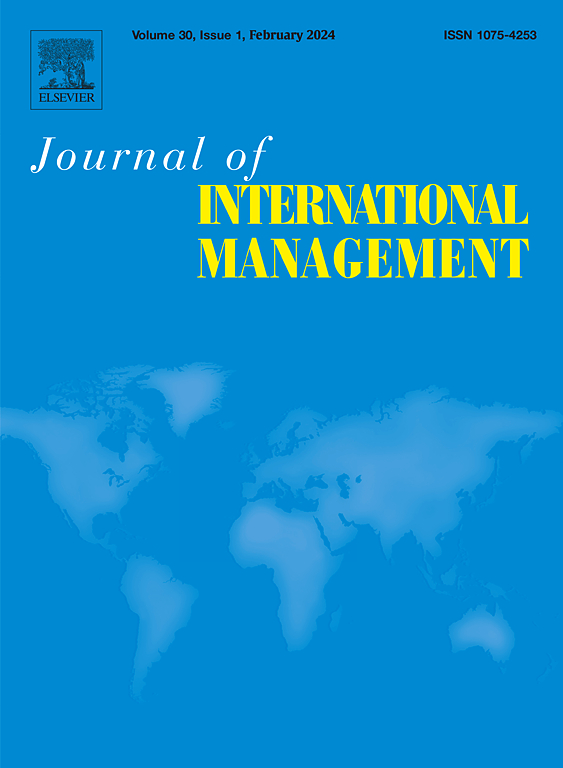政治亲和力变化对全球供应链机会主义的影响:民族文化的调节作用
IF 5.9
2区 管理学
Q1 MANAGEMENT
引用次数: 0
摘要
机会主义对全球供应链有长期的负面影响。虽然现有的研究传统上侧重于市场和制度环境对机会主义行为的影响,但它忽视了全球供应链运营所涉及的双边政治环境。本研究旨在通过关注国家间政治亲和力变化的潜在影响来弥合这一差距。本研究以资源依赖理论和合法性为基础,探讨了政治亲和力的变化(正面和负面)如何影响机会主义,以及民族文化(不确定性规避和长期导向)的调节作用。利用对381家中国企业在两个时间点和两个辅助数据集的调查数据,本研究发现,政治亲和力的积极变化减少了机会主义,尤其是当合作伙伴位于一个高度不确定性规避的国家时。此外,政治亲和力的负向变化对机会主义具有u型效应,而长期取向文化可以强化这种效应。我们的研究结果为学术研究和管理实践提供了重要的启示,为政治亲和力变化对机会主义的影响提供了细致入微的理解。本文章由计算机程序翻译,如有差异,请以英文原文为准。
Impact of changes in political affinity on opportunism in global supply chain: The moderating role of national culture
Opportunism has long-term negative consequences for global supply chains. While the extant research has traditionally focused on market and institution environment in shaping opportunistic behavior, it has overlooked the bilateral political environment where global supply chain operations are embedded. This study aims to bridge the gap by focusing on the potential influence of changes in political affinity between countries. Drawing on resource dependence theory and legitimacy-based view, this study examines how changes (both positive and negative) in political affinity affect opportunism, as well as, the moderating role of national cultures (uncertainty avoidance and long-term orientation). Using a survey dataset of 381 Chinese firms at two time points and two secondary datasets, this study finds that positive changes in political affinity decrease opportunism, especially when partners are located in a country with high uncertainty avoidance. Moreover, negative changes in political affinity are found to have a U-shape effect on opportunism, which can be strengthened by long-term orientation culture. Our findings offer important implications for academic research and managerial practice by providing a nuanced understanding of the effect of changes in political affinity on opportunism.
求助全文
通过发布文献求助,成功后即可免费获取论文全文。
去求助
来源期刊

Journal of International Management
MANAGEMENT-
自引率
9.80%
发文量
67
审稿时长
81 days
期刊介绍:
The Journal of International Management is devoted to advancing an understanding of issues in the management of global enterprises, global management theory, and practice; and providing theoretical and managerial implications useful for the further development of research. It is designed to serve an audience of academic researchers and educators, as well as business professionals, by publishing both theoretical and empirical research relating to international management and strategy issues. JIM publishes theoretical and empirical research addressing international business strategy, comparative and cross-cultural management, risk management, organizational behavior, and human resource management, among others.
 求助内容:
求助内容: 应助结果提醒方式:
应助结果提醒方式:


